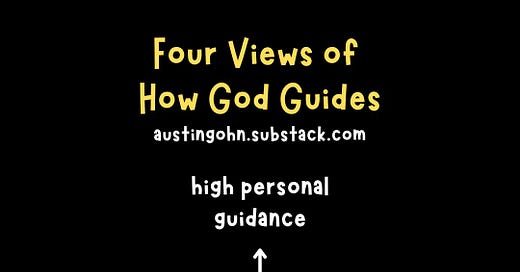(05/40) Four Views of How God Guides
Does God guide you more like an absentee parent, a helicopter parent, a cool parent, or a free-range parent? (And, one of my favorite x-y grids ever.)
“What comes into your mind when you think about God,” A.W. Tozer has famously said, “is the most important thing about you.”
Well, yes—and no.
The problem is that what comes into your mind when you think about God isn’t always the view of God that’s operating in your heart. Dr. Todd Hall, a psychology professor at Biola University and author of The Connected Life, has pointed out the gap that exists between what you think about God and what you feel about God at a deeper-level—between your “explicit knowledge” of God and your “implicit knowledge” of God.
You could tell me what comes into your mind when you think about God, but that might sound different than the view of God I might discover operating at a functional-level in your life as you navigate the different decisions you face.
Why does this matter?
John Mark Comer said it this way, “Your mind might be able to give the right answer [about God] but your body—often without even your awareness—is often being driven by this heretical vision of God that seriously distorts who God is.”
Your view of God is probably the single most significant factor in your experience of hearing from God in day-to-day life, but even if you can express the right view of God on paper, your functional view of God might still be getting in the way.
Can you still hear from God if you have the wrong view of him?
Of course. As the quote from Madeleine L’Engle I shared in a previous email says, God can always find a way to get through to us. (Just read about some of the pagans who experienced God’s guidance—like Balaam in Numbers 22:21-35.)
But, as we’ll explore in this email, while there are four main views of how God guides us, only one of those views has the potential to open the door to consistently experiencing his guidance in your life.
How Did Your Parents Guide You?
So, how should you view God?
Jesus would encourage you to think about a parent—in particular, a father.
In fact, when he teaches us how to talk with God, he says that we should start with the word father (Luke 11:1-4, CSB). Talking with God, Jesus says over and over, has parallels with how a kid might talk with his or her dad. When you’re talking with God, you’re talking with a father, which means, of course, that when God starts talking back, you’re listening to the voice of a father.
So, the question is: How would a father—or a parent, in general—guide you?
I wish it was simple.
As you can imagine, your default answer to that question is probably going to look different than my default answer to that question—and, positively and negatively, it’s probably going to be influenced more by your parental attachments growing up than your stated theological commitments.
So, maybe a better starting question is: How did your parents guide you?
This is where it gets messy.
You might have had a dad who just wasn’t involved in your life, and you long for the kind of conversational relationship your friends seemed to have with their dads. You would have given anything to get his guidance at pivotal moments in your life.
Or, maybe, it felt like your mom was constantly telling you what to do and never gave you any room to figure things out on your own—hovering over your every move. You wish she would have just given you a bit more space. And, now, you still feel incapable of making a decision without first consulting her.
You might have been in a family where your parents just wanted to be your best friends, and they never told you if you were doing anything wrong or just plain stupid—even if, looking back, you wish they had every once in a while because it might have saved you some pain.
Or, maybe, you had parents who taught you some basic wisdom growing up. Then, as you grew in wisdom, they trusted you with as much freedom as you could handle to make decisions on your own while still providing just the right amount of as-needed guidance to help you navigate some of what life threw at you.
Again, at a gut-level, how you experienced your parents’ guidance (or lack of it) growing up might be shaping how you experience God’s guidance now—more than you think. If you don’t let the Bible fill in the picture of what kind of father God is, your past experiences will.
No matter what your experience of guidance from your parents was like, though, learning to hear from God starts with naming your functional view of how God guides you and moving toward a biblical view of how God guides you—if you’re not already there.
Welcome to the Guidance and Freedom Grid
As I’ve talked with people over the years about how they view God (in particular, how God guides us), it usually comes back to four basic views that align with four different parenting styles. To help you see where you might land, I’ve set the four views on an x-y grid—with low/high freedom on the x-axis and low/high personal guidance on the y-axis.
Here’s a brief explanation of each of these four views:
Absentee God: This is the low personal guidance, low freedom view of God that believes God has already said everything he’s going to say in black and white in the Bible about every situation you’re going to face—so just read it, obey it, and don’t expect him to call.
Helicopter God: This is the high personal guidance, low freedom view of God that imagines God as hovering over every decision you make throughout the day without leaving any space for you to use your God-given wisdom.
Cool God: This is the low personal guidance, high freedom view of God that sees God as some kind of divine cheerleader who is just there to affirm whatever decisions you were already going to make anyway because you know what’s best for you.
Free-Range God: This is the high personal guidance, high freedom view of God that’s closest to how the Bible describes God’s guidance—free-range in the best sense of the phrase. He’s clear about boundaries, and he leaves plenty of room for you to make wise decisions within those boundaries. At the same time, he’s not a latch-key parent of the 80s who simply leaves you on your own. He’s personally involved in your life and ready to provide guidance as you need it in a variety of ways.
In the comments, let me know: Where on the grid would you place your current or past “functional” view of God and his guidance, and where do you think that comes from?
In the next four emails, we’re going to explore each of these four views of God in-depth and how they operate in our lives as we seek God’s guidance. No matter what functional view of God you’re starting from, God is inviting you to move toward a more biblical view that opens the door to experiencing his voice in a fresh way.
Miss a post? Get caught up here. Or, start with the first email.






